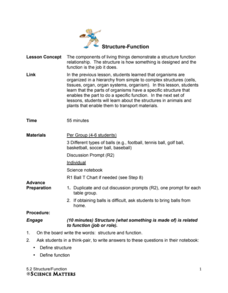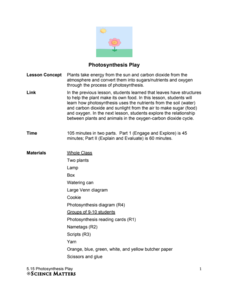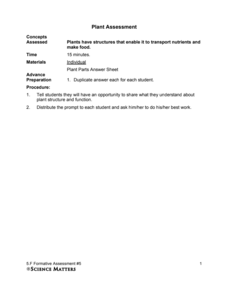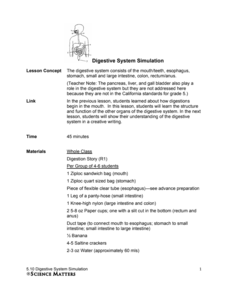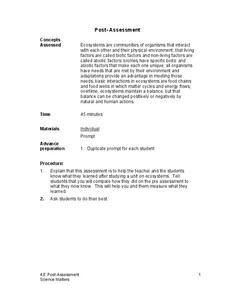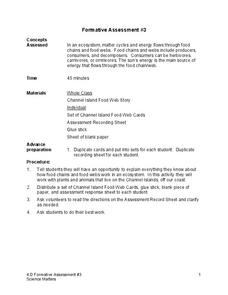Science Matters
Just Breathe
Pupils know they need to breathe to live, but the details may not be too clear. A thorough lesson plan introduces them to the components of the respiratory system using a set of cards with pictures and descriptions.
Science Matters
Structure-Function
Without structure, there wouldn't be function. Scholars examine the meaning of structure and function with a hands-on experience. Using balls from different sports, they compare and contrast their structures and then analyze how each...
Science Matters
Hierarchy
A system is only as good as the sum of its parts! Young scholars explore the components of the different body systems using a hands-on instructional activity. The instructional activity helps learners build an understanding that there is...
Science Matters
Post- Assessment: Transport Systems in Animals and Plants
A little bit of this and a little bit of that. The final lesson of the 21-part unit assesses learners on each animal and plant system. The test covers the basics of each system and focuses on key vocabulary from the unit.
Science Matters
Formative Assessment #6: Photosynthesis Cellular Respiration
You know you taught it, but did they learn it!?! A quick formative assessment asks pupils to describe both photosynthesis and cellular respiration before showing how they relate to each other. The lesson marks the 20th lesson in a...
Science Matters
Photosynthesis-Cellular Respiration Cycle
The balance of nature can be a wondrous thing! With the 19th lesson of the 21-part series on systems, learners explore the cycle of photosynthesis and cellular respiration using a lab-based activity. Groups set up different test tubes...
Science Matters
Photosynthesis Play
Photosynthesis seems nothing short of magic: a little carbon dioxide and water, add energy, and poof, you get food! A thorough, collaborative lesson plan teaches youth the process of photosynthesis thanks to a skit they perform with a...
Science Matters
Formative Assessment #5: Plant
Information from formative assessments is vital to plan for instruction. The 17th in a 21-part series of lessons on plant and animal systems quizzes pupils on their knowledge of the function of plant parts. Given a part of the plant,...
Science Matters
Celery Lab
See firsthand the work plants do to move nutrients through their systems with a instructional activity that demonstrates the role of the xylem and phloem in plants. Young scientists observe celery move colored water through its stem to...
Science Matters
Digestive System Simulation
What do a sandwich bag and a mouth have in common? Your classes are about to find out in a hands-on lesson that has groups build models of the digestive system. Using a little imagination, learners use everyday materials to create a...
Science Matters
Excretory System
Not a waste of time or energy! Introduce young scholars to one of the waste eliminating systems of the body in a hands-on instructional activity exploration. The 14th instructional activity in a 21-part series asks groups to build models...
Science Matters
Formative Assessment #3: Digest This
Finally, an assessment that shouldn't be too hard to swallow! Scholars study the digestive system in the previous lessons in the series and show what they know in an open-ended assessment. They pretend they are their favorite food and...
Science Matters
Formative Assessment #2: Circulatory System Performance Assessment
Watch as your pupils' hearts get pumping! An interactive activity has individuals record their heart rates after completing different activities. Each task has a different degree of physical activity. They then graph their results and...
Science Matters
Heart to Heart
It's time to get to the heart of the matter! After introducing the heart anatomy in the previous lesson in a series on the systems of the body, the lesson looks at the specifics. Learners complete a series of six activities to study the...
Science Matters
You Gotta Have Heart
Here's a lesson that's not for the faint of heart! The seventh activity in a larger series introduces learners to the circulatory system with a study of the heart anatomy. Using a pig heart, individuals identify the different components...
Science Matters
Formative Assessment #1: Structure/Function
Just because you taught it doesn't mean they learned it! Use a quick formative assessment to check for understanding and ensure all individuals understand the role of structure and function. The lesson is the fourth in a larger series on...
Science Matters
Pre-Assessment: Transport Systems in Animals and Plants
How much do classes know about the transport systems in animals and plants? Find out with a ready-made pre-assessment! The assessment begins by asking individuals to recall related vocabulary and then progresses to questions about...
Science Matters
Post-Assessment
Twenty questions make up an assessment designed to test super scientists' knowledge of ecosystems. Scholars answer multiple-choice and short-answer questions about organisms, food chains, energy flow, and more.
Science Matters
That’s An Otter Story
Young scientists discover how sea otters' habitats have changed due to human impact. Through conversation, video observation, and story reading, scholars identify how human interactions change a specific ecosystem in both positive and...
Science Matters
Formative Assessment #3
Thirteen short-answer questions follow a brief food web activity in a formative assessment designed to test knowledge of ecosystems and the energy that flows through them.
Science Matters
Energy Flow
Budding scientists work collaboratively to reenact energy flow in a food chain. Scholars take on roles such as producer and consumer and perform tasks that symbolize energy flow in order to provide evidence of how much energy passes...
Science Matters
Crawly Composters
Get your hands dirty with an interactive instructional activity that showcases the process of decomposing and returning nutrients back into the soil. After building a compost pile, pupils regularly observe the...
Science Matters
Matter Cycles — Sum It Up
Scholars become part of the cycle of matter with a reader's theater that showcases producers, consumers, decomposers, and the sun. A diagram and discussion concludes the learning experience and enhances comprehension.
Science Matters
Mighty Microorganisms
How can you tell if a microorganism is helpful or detrimental to an ecosystem? Learners inspect slides or pictures of microorganisms and record their observations to...



